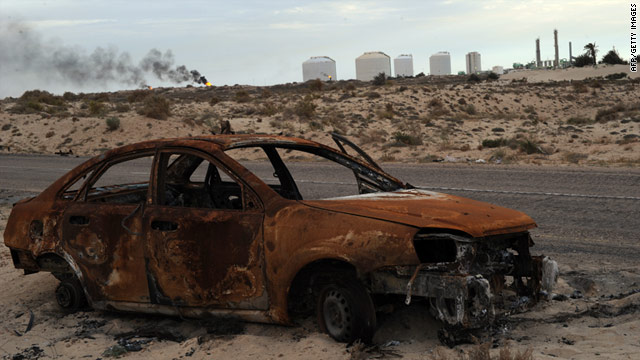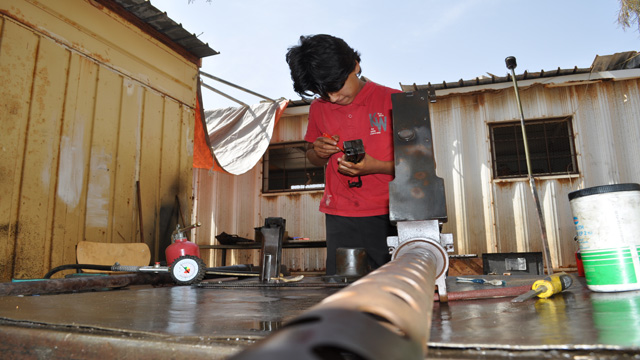
From The Honorable Sis. Cynthia McKinney: Secret Bombings, Stealing Oil, Stealing A Continent, NATO's Libyan Child Soldiers? Vietnam War Lies
Yesterday, I went to the home of a darker-skinned Libyan murdered by the Libyan NATO allies because of the color of his skin. I will write a full report of this shocking meeting.
Revelations of secret bombing in Yemen bring President Obama closer to Lyndon Baines Johnson and Richard Nixon and their secret bombings of Laos and Cambodia during the Vietnam War than is appropriate for any Nobel Peace Laureate. How many wars is this President going to start? As many as the American people will allow.
Der Spiegel reports that the Pentagon released the remaining papers of the Pentagon Papers while admitting that lies were told about the war. We know that. But here it is from them. The four volumes of the Gravel Papers can be accessed through Der Spiegel by clicking on the link below. How many more lies will the U.S. government tell the American people and the international community? As many as the American people will allow.
Are NATO's allies child soldiers? Isn't that against the law? So what else is new with this war? How long will war crimes and crimes against humanity be committed by NATO? As long as the American people allow these crimes to be committed.
Please see these:
1.
Libyan rebel group sells first oil to U.S.
By Jamie Crawford, CNN National Security Producer
June 9, 2011 -- Updated 1012 GMT (1812 HKT)
June 9, 2011 -- Updated 1012 GMT (1812 HKT)

A charred car sits near an oil terminal in the section of eastern Libya now held by the Transitional National Council.
STORY HIGHLIGHTS
- Tesoro, a U.S. refiner, entered into a deal May 25 with the Transitional National Council
- Deal is for 1.2 million barrels of Libyan crude oil, the State Department says
- Secretary of State Hillary Clinton arrives in UAE for Libya Contact Group meeting
RELATED TOPICS
Washington (CNN) -- The rebel government in
control of the eastern part of Libya has made its first sale of oil from
territory it controls, the State Department confirmed Wednesday.
Tesoro,
a U.S. oil refiner, entered into a deal May 25 with the Transitional
National Council based in Benghazi, Libya for 1.2 million barrels of
Libyan crude oil, the State Department said in a written statement. The
shipment was scheduled to arrive aboard the MT Equator, a
Liberian-flagged tanker, at the Single Point Mooring in Hawaii on
Wednesday. The dollar value of the deal is not known.
U.S.
support for additional oil sales with the TNC will continue as a means
to support additional revenue streams for the Libyan people, the
statement said.
The sale was made possible following an April
announcement by the Office of Foreign Assets Control at the Treasury
Department that established a new licensing policy with Libya. That
action was taken to ease barriers to certain oil related transactions
with the TNC, in place because of wider U.S. sanctions on Libya.
The
announcement came the same day Secretary of State Hillary Clinton
arrived in the United Arab Emirates for a meeting with the Libya Contact
Group, a coalition of various countries and international organizations
that seek to build support for the TNC while preparing for Libya's
future after the presumed end of Moammar Gadhafi's regime. This is the
third meeting of the group.
France, Italy and Qatar are among the
small number of countries who have officially recognized the TNC as the
legitimate government of Libya. While the United States has yet to take
that step, President Barack Obama "has invited them to open an office
in Washington," a senior administration official told reporters
traveling with Clinton.
"We are still considering it but there's
no final decision as of right now," the official said of U.S. efforts to
offer formal recognition to the TNC.
Jeffrey Feltman, Assistant Secretary of State for Near Eastern Affairs, traveled to Benghazi last month for two days.
8 June 2011
Last updated at 18:57 GMT
Hedge Funds 'Grabbing Land' In Africa

Foreign firms are snapping up farming land in Africa, a new report says
Related Stories
Hedge funds are behind "land grabs" in Africa to boost their profits in the food and biofuel sectors, a US think-tank says.
In a report, the Oakland Institute said hedge funds and other
foreign firms had acquired large swathes of African land, often without
proper contracts.
It said the acquisitions had displaced millions of small farmers.
Foreign firms farm the land to consolidate their hold over global food markets, the report said.
They also use land to "make room" for export commodities such as biofuels and cut flowers.
"This is creating insecurity in the global food system that could be a much bigger threat than terrorism," the report said.
The Oakland Institute said it released its findings after studying land deals in Ethiopia, Tanzania, South Sudan, Sierra Leone, Mali and Mozambique.
'Risky Manoeuvre'
It said hedge funds and other speculators had, in 2009 alone,
bought or leased nearly 60m hectares of land in Africa - an area the
size of France.
In The Field
Umaru Fofana
BBC African Service, Sierra Leone
When I visited Lungi-Lol in rural Sierra Leone I saw men
hoeing thousands of hectares of farmland owned by Addax, a Swiss-based
bio-energy company.
They are growing sugarcane to produce biofuels.
Campaigners say this contributes to food insecurity, but many people here welcome Addax's presence.
Francis Koroma, who works on the farm, says: "We thank God
for Addax. I am gainfully employed and I receive about $70 (£46) a
month. Before, I spent a whole year without getting $50."
Villagers are unaware of the controversy surrounding biofuels.
Abdulai Conteh , a local traditional leader, said: "Some
people are doing business here but I have no idea what they are doing
with our land. I see them growing sugarcane. That's all I know."
"The same financial firms that
drove us into a global recession by inflating the real estate bubble
through risky financial manoeuvres are now doing the same with the
world's food supply," the report said.
It added that some firms obtained land after deals with gullible traditional leaders or corrupt government officials.
"The research exposed investors who said it is easy to make a
deal - that they could usually get what they wanted in exchange for
giving a poor tribal chief a bottle of Johnnie Walker [whisky]," said
Anuradha Mittal, executive director of the Oakland Institute.
"When these investors promise progress and jobs to local chiefs it sounds great, but they don't deliver."
The report said the contracts also gave investors a range of incentives, from unlimited water rights to tax waivers.
"No-one should believe that these investors are there to feed starving Africans.
"These deals only lead to dollars in the pockets of corrupt
leaders and foreign investors," said Obang Metho of Solidarity Movement
for New Ethiopia, a US-based campaign group.
However, not all companies named in the report accept that
their motives are as suggested and they dismiss claims that their
presence in Africa is harmful.
One company, EmVest Asset Management, strongly denied that it was involved in exploitative or illegal practices.
"There are no shady deals. We acquire all land in terms of
legal tender," EmVest's Africa director Anthony Poorter told the BBC.
He said that in Mozambique the company's employees earned salaries 40% higher than the minimum wage.
The company was also involved in development projects such as the supply of clean water to rural communities.
"They are extremely happy with us," Mr Poorter said.
3.
Children Work With Weapons To Aid Libya's Rebels
By Sara Sidner, CNN
June 9, 2011 -- Updated 0249 GMT (1049 HKT)
June 9, 2011 -- Updated 0249 GMT (1049 HKT)


Libyan kids help refurbish weapons
STORY HIGHLIGHTS
STORY HIGHLIGHTS
- Nasser spends most of his time now in the yard of a weapons workshop
- Libyan rebels say they can use all the help they can get
- With schools closed by the fighting, young people have little to do
Misrata, Libya (CNN)
-- The eyes of 15-year-old Nasser are fixed on a small metal part that
belongs to a massive metal gun. He scrubs every tiny little crevice with
a toothbrush until the bristles bend in awkward directions from the
strain.
This is how he now spends his time six days a week for 10 hours a day in the open yard of a makeshift weapons workshop.
Nasser
is one of Misrata's children. A boy who for more than 100 days suffered
the frightening sounds of rockets falling from the sky and tanks
blasting their way through the city as government forces battled to
control the uprising against it from Misrata's citizens.
"It was
really scary," he said. "People really suffered especially during the
first days of the war. There was not really anything, we lacked
everything."
Four
months later school is still out but the fighting has been pushed to
three fronts outside the city. There is little for children to do.
Nasser has found something along with a few other boys and he dismisses
those who say children shouldn't be working on machines of war.
 NATO making progress in Libya?
NATO making progress in Libya? New lies from Gadhafi's regime
New lies from Gadhafi's regime
RELATED TOPICS
"I'd tell them to get back to work and try to understand the
situation we are living these days," the 15-year-old said and quietly
went back to putting together the gun he had just finished cleaning.
The
adult men working in the same area have nothing but good things to say
about the effort the youth are making even the youngest among them.
"When
I saw our young people my feeling is great," Ali Mohamed said. "Our
children, they will be the future of our country and they should know
how they defend our city."
The
reality is rebel fighters are short on gun power and need whatever help
they can get in order to obtain more weapons. They say defending the
city means using all kinds of makeshift weaponry on Misrata's three
battlefronts. The heaviest and most powerful guns are usually attached
to pick-up trucks.
The guns are often taken off tanks and
re-purposed elsewhere. The tanks that are captured are usually burned or
otherwise rendered useless but there are a few that have survived
intact, and yet with all the shortages of weaponry not one is being used
on Misrata's front lines.
"We
cannot use the tanks because we received orders from NATO not use them
so they put restrictions on how we can use them," rebel fighter Mohamed
Wabash tells CNN.
There is frustration setting in as opposition
fighters have also been told to hold their positions but in this
spontaneous uprising, war has not been meticulously planned. Strategies
are being hatched in real time as the fighting rages on.
But
rebels on Misrata's western front made an unexpected move forward after
they say Gadhafi forces tried to once again advance toward the city.
Rebels fought back with all their make-shift weapons and managed to push
Gadhafi forces three kilometers west inching them that much farther
toward the rebels goal, the capital of Tripoli.
Full release of the Mike Gravel Pentagon Papers
admitting wartime lies
Updates mailing list
Updates@lists.
http://lists.
More Sis. Cynthia McKinney On W.E. A.L.L. B.E.:
http://weallbe.blogspot.com/search?q=CYNTHIA+MCKINNEY
W.E. A.L.L. B.E. Radio: We Want Freedom Now! Cynthia McKinney Live!
--
Silence is the deadliest weapon of mass destruction.
______________________________
Updates mailing list
Updates@lists.
http://lists.
More Sis. Cynthia McKinney On W.E. A.L.L. B.E.:
http://weallbe.blogspot.com/search?q=CYNTHIA+MCKINNEY
*W.E. A.L.L. B.E. News & Radio Special*
The Honorable Sis. Cynthia McKinney Tribute Show!!!
http://www.blogtalkradio.com/weallbe/2008/08/03/Tha-Artivist-PresentsWE-ALL-BE-News-Radio
The Honorable Sis. Cynthia McKinney Tribute Show!!!
http://www.blogtalkradio.com/weallbe/2008/08/03/Tha-Artivist-PresentsWE-ALL-BE-News-Radio



No comments:
Post a Comment